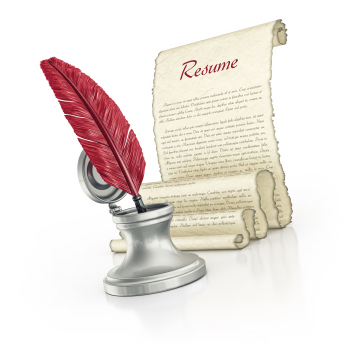
Some people think that resumes are nothing more than a list of your accomplishments, the jobs you’ve had, and the number of places you’ve worked. But, it’s not that easy to construct a resume that markets you to your prospective employer. A resume should be designed to sell you and your potential to an employer. That means that you have to make decisions about how to present your traits.
A resume has to be like an advertisement, it needs to catch the reader’s eye and meet their particular needs. If you’re applying for an accounting job, then you wouldn’t need to showcase your creative writing talents on your resume. You would need to show that you have the skills required to perform the duties of the position at a high level. That doesn’t mean putting everything you’ve ever done on your resume, it just means you have to understand your market and how to reach them. Make sure you put your best foot forward.
Look over your work history and pick the selling points that best highlight your value. Depending on the position, you should highlight specific skills that you have. Deciding what makes the most unique selling points can be the hardest part of writing a resume. Here are five basic steps to help design a resume that markets your skills to employers:
1. Choose the most relevant information first. Focus on the skills and experience that are most important to the job you’re applying for. You may have a whole range of skills, but focus on the ones that are most important for your particular employer. Even if you’re qualified based on past experience, don’t put all of your eggs in one basket. Instead, make sure that you focus on the skills that are going to set you apart from other potential employees.
2. Showcase the cutting edge, without too much emphasis on the outdated. More experienced workers should focus heavily on this. Any professional should continue to update their resume with new talents and show that they can adapt to new challenges. You may know the beginnings of C+ language, but it will help if you know Flash or Linux.
3. Tangible examples are best. Be specific as possible and use tangible evidence of improvements if you can. Just saying that you have an excellent track record of improving sales doesn’t show much, you need to show actual figures.
4. Use multiple resumes to market yourself in a different manner. If you’re applying for several different types of positions or in different industries, you need to have a resume suited to that profession. So create several different resumes that highlight your skills for that particular position.
5. Get a second opinion. This is perhaps the most important thing you can do. It can be hard to be objective about your career. Give your resume to a friend or a family member, or if you have someone in your industry – even better.
What Separates Good Resumes from Bad Resumes?
BlogCareer & WorkplaceExecutive ResumesJob SearchProfessional ResumesResume KeywordsResume Writing

Resumes mean so much to hiring managers. It’s your first introduction to a prospective employer and it’s how you differentiate yourself. But what separates the bad resumes from the good ones?
The best resumes avoid abbreviations. Abbreviations are not professional nor are they accepted. Nothing makes HR managers cringe more than seeing sentences like the following: “Answered the phone and went 2 C clients” (yes, I truly have seen this). It may be the information age but this is not a text message so don’t treat it as such.
Giving up too much personal information is a no-no. You should leave off anything related to hobbies or interests that are not related to the job. Do not include your weight and height unless you’re applying for a position as a gym trainer. If it’s not related to the job in any way, do not include it on your resume. Leave out your illnesses or why you took off 2 years to care for a dying parent. As hard as that may have been, it will count against you.
The best resumes are the best because they’re not being used as an art canvas. If you try to stand out by having large graphics on your resume it’s a bad move, because this will give you an unprofessional and amateurish looking resume. Your prospective employer only wants to see your skills, your duties and achievements. You’re not going to get anywhere by having a Word Art picture of a snail on your resume.
Keep the negativity to yourself. The best resumes are neutral in tone or highlight the best attributes of the applicant. But, if you have information on your resume that is negative, such as, leaving your previous employer because you did not like the boss, just keep that part to yourself. Do not try to explain the situation on your resume. That’s an impossible battle that you should not fight. Your resume’s job is to sell and promote you. So don’t eliminate yourself because you were negative.
Good resumes include dates. Do not make an HR manager have to guess. This kills your resume on the spot. You have to include dates. What years were you in college, did you attend graduate school or did you graduate from a trade school? How long have you been working at your current position? Do not make the hiring manager have to ask questions about your resume. The second they have to guess, your resume is going straight to the trash. Make sure your resume flows easily and there are no date gaps. If you took a year off to go travel or to go back to school, include this on your resume.
Bad resumes do not highlight achievements. Many people will fill their resumes with irrelevant information, but they leave off the most important part of the resume – focusing on their achievements. You want to stand out from other applicants, so how can you do that if you do not showcase what you’ve done. Explaining your past accomplishments means that the HR manager can see what you’ve done and know how you can fill their need. If you have the abilities, you need to showcase them on your resume.
Targeting Your Resume to Get the Results You Want
BlogCareer & WorkplaceExecutive ResumesJob SearchProfessional ResumesResume KeywordsResume WritingResumes

Even if you have an excellent resume, it still may not be targeted to find the right kind of work for you. What can you do to increase the number of responses you get from employers?
Customization is Key!
Blasting your resume out for every position you see won’t help you find the right job. If you want to grab an HR manager’s attention, you need to give them what they are looking for. You need to take the time to customize your resume for each employer and highlight your strengths that will set you apart.
Before you respond to a job posting, look over the job description and see what the credentials are. If you submit your application to a company that does not post the requirements, then look around at other similar positions. Odds are that you can find similar information that will allow you to tailor your resume. Once you’ve found your qualifications, you will be at the right place to meet that employer’s specifications.
The most convenient way to customize your resume is to create a master resume and then tweak it depending on each individual job’s requirements. If you want to tweak your resume, then try these steps:
Copy the Master Resume
Find the resume that is right for you to begin with-you don’t want to use your resume that is based on your pre-job experience qualifications, so find one that is current enough for you to tweak it accordingly. Now you’re ready to customize your resume for whatever position you’re applying for.
Start with the Title
Start with your stated career goal, along with two or three of your top credentials. You need to tailor these credentials to your specific employer’s job requirements. For example: “Advertising Manager – Advertising Degree with 10 Years Experience in an Agency.”
Examine your Objective
You need to show that you are perfectly capable of handling this job’s requirements. Create a precise, short resume objective instead of a blanket statement that would work with any job. If your goal is to be the “Chief of Software Development for Bank of America’s online data privacy support,” then it will show the HR manager that you have real, honest goals. It also makes you more attractive to their specific needs.
Summary of Qualifications
Once you have an outline of the job’s requirements, you can begin to tweak your qualifications to match those in the the position you are seeking. If you handle this step correctly and match up with what the company’s needs, you will become the number one candidate. Add some information that is uniquely applicable to your desired position. You have to stand out.
Expand your Job Descriptions
A lot of HR managers will go straight to the prospect’s employment history to assess their qualifications. Review your listed job descriptions and see how you can modify them to more accurately reflect your past experiences. You’ve probably done some of the functions at a previous employer that will be applicable to the current HR manager. Place the most compelling qualifications at the top of the description and make sure they stand out.
Don’t leave out the Skills
Once you’ve found the right job for you, look at the required skills on the job posting and match what the job requires with your skills. Place the skills that would be most beneficial to your prospective employer at the top of the skills section.
Resume Tips That Set You Apart From Your Peers
InterviewingJob SearchProfessional ResumesResume KeywordsResume WritingResumesSuccess Strategies

Your resume is your marketing tool for success. You need to be able to advertise your skills and ability to succeed with your prospective employer. The format and feel of your resume can either open doors or close them, often this feeling can make people question why they didn’t get the interview or thinking they are not qualified.
The resume that lands you the job interview isn’t a simple listing of your past duties or work experience. It has to convince readers that you have the required skills and abilities to exceed the expectations of the position, so your resume should be structured in a way that arouses employers interest in you and gives them reasons as to why you are more qualified than others, while encouraging the employer to get in touch with you for an interview.
Most people do not realize that employers will do a quick scan of a resume, it typically lasts only a few seconds. They’re looking for key skills and accomplishments that the perfect candidate will have. So capturing the employers attention is critical or else you’re information can get lost in the shuffle.
To prevent your resume from ending up in the “Trash” file, here are some helpful resume tips that will set you apart from the rest.
1. Review the job posting and description carefully
A lot of the time, job-hunters will write one generic resume and send the same generic resume to every employer. This is one of the biggest mistakes facing job seekers because it produces so-so resumes that don’t necessarily match the employers requirements.
You need to highlight your appropriate skills for that job. Reviewing the job requirements is a great way to tailor-make your resume contents to the employers needs.
2. Know the difference in resumes
There are two main types of resumes: chronological resumes and functional resumes. Chronological resumes coordinate your past job experience and place emphasis on your experiences that apply to that field.
Functional resumes are good when you have little to zero work experience (or new grads). This type of resume allows you to showcase skills that fit in with the job requirements. Fair warning: most recruiters and hiring managers don’t like this format and feel as though you may be “hiding” something.
If you have a chronological resume, you do not want to have one part chronological and one part functional, because it will throw off the entire formatting and may confuse the employer about your skill set.
3. Focusing on accomplishments
Focusing on what you have accomplished will help to set you apart from your peers. You should highlight the value you’ve brought to companies and the success that they have seen while you are there. Companies are looking for game-changers, they want 5 star recruits, not 2 star players who are not up to the challenge. You have to make yourself into a 5-star recruit, you cannot rest on your laurels and hope for the best. Spotlighting your success will show potential employers that you are capable of outperforming your peers.


In this new digital age, more and more employers are turning to the Internet for their hiring needs. Whether posting open positions on a company owned website, utilizing job boards or social media, job seekers are becoming increasingly aware of the importance of understanding how to post resumes online. Because of the various formats that are needed, developing a strong portfolio of resumes is critical for those hoping to find the perfect new job.
Take a minute to consider the different forms of resumes. Electronic, print, plain text and full HTML are the most popular options. The reasons for the various forms are simple: prospective employers use a variety of tools to collect and collate resumes. Deciding which is appropriate and properly formatting it is critical for success.
The traditional print resume (like Microsoft Word, for example) often doesn’t translate well online. Because of this job seekers are encouraged to develop a variety of electronic formats for their resume.
- Text: A simple text resume that focuses less on fancy formatting and more on presenting clear details is a must. Resume writers also call this an ASCII (American Standard Code for Information Interchange). This format is ideal for posting resumes into formats on websites. While it is still important to review the post, sticking with a clean text format often removes many of the formatting issues seen.
- Email: Even more basic than the text format, creating an email ready resume takes into consideration line spacing rules often imposed by email providers. Often a simple matter of tweaking a copy of the text resume, creating an email ready version allows you to post your resume directly in the body of an email.
- HTML: As more and more people turn to the Internet for their business needs, many are creating HTML resumes. This is perfect for those that wish to create an electronic portfolio of their work. A word of caution: providing too much information is an easy pitfall of the HTML resume as is simply creating a flashy version of your resume. Only utilize the HTML format if you have basic HTML knowledge.
It is important to acknowledge that where you post your resume online is almost as important as the format it takes. While it may seem like a good idea to attach your resume to a personal website or social media profile, remember that doing so gives potential employers access to all sorts of information that is often best kept private. Marital status, past health issues, ethnicity, political leanings and more can often be found directly on a personal website. It is best to avoid giving potential employers access to this information too early in the process.
In a world where technology is quickly becoming a necessity, not understanding the basic differences in formats is a big mistake. A poorly formatted resume can make you look disinterested and technologically inept. Be sure to spend the appropriate amount of tie developing resume formats to ensure your resume makes the statement you want it to.


The career summary typically is positioned beneath your contact information, directly above job experiences. It offers you a chance to quickly summarize all of your relevant experience in one place. By carefully selecting achievements and successes in your career summary, you are creating an effective picture of what you can offer a company. Use your career summary to easily point out what experiences from each of your previous jobs is applicable to the one you are seeking.
While a career summary is not mandatory, and is not suggested for people with little experience, most job seekers can benefit by including a summary in their resume. Writing an adequate summary takes a little bit of skill and should be done on a case by case basis. If you are looking for a new position and would like to include a career summary on your updated resume, there are a few simple steps to take.
- Update your resume: update your resume with new experience and achievements as you normally would.
- Review positions: during your job search, carefully review each position you are interested in for their specific qualifications. For example, a particular position may require five or more year’s experience.
- Customize your summary: create a new career summary for each position you are apply for, utilizing the specifications discovered during your review.
By creating custom career summaries for each position you apply for you can easily tailor your resume for each position.
Formatting your career summary is easy as well. Most resume experts agree that a bullet point format is best for your career summary section. Try to include three to five bullet points, applicable to each specific job, in your career summary. The bullet points draw the eye and customized qualifications will guarantee further interest in you as a candidate.
Always remember that by not including a career summary with your resume most of your experience is likely to be overlooked. Most hiring professionals quickly scan initial resumes, focusing almost entirely on the last position held. They are unlikely to look at previous experience, meaning much of your experience will be unread and ineffectual. A career summary allows a hiring professional to understand how your entire career experience has molded you to be a perfect fit for their needs.


After talking with so many people, I know many of you work and work to create the perfect resume, only to look it over when you are finished and realize your resume doesn’t say, or reflect, just what you want it to. And often times, that keeps you from being called for interviews.
I’ve included a list of “deal breakers” that might hinder your chances for an interview:
1. Mizspelld Words or Bad Grammar
While spell-check is good, it doesn’t catch everything – there could be a word that’s spelled right, but not the right word for the context of the sentence. Keep that spell-check in action but don’t rely on it exclusively. Misspellings can be the death of your application, no matter how qualified you might be. Think of how embarrassing it would be if you have been a mechanical engineer for 30 years and spell it ‘michanical’ engineer on your resume. Lots of times we accidentally misspell words that are actually words themselves i.e. “manger” instead of “manager”.
There can be other consequences, as well–misspelled words could interfere with resumes being found in the key word search of a resume database. So, proofread your resume yourself – it’s important.
*Be sure to keep tenses consistent and check for the correct word usage (such as “counsel” versus “council”).
2. Using a Vague Job Focus
Be clear on the type of position you want to target – your resume should be geared toward that. If you just say “Medical Field” or “Manufacturing,” the reader does not know what type of position you want, so your resume will probably not be considered. Make sure you are specific as to the type of job you want, such as “Accounting Professional”, “Senior Management Executive”, or “Educator.”
3. Not Including your Personal Brand, or your Value
In today’s challenging job market, showing your uniqueness – your personal brand; and letting potential employers see the value you bring to a new position is essential. Your resume must reflect why an employer should pick up the phone and call you for an interview over the hundreds of other resumes sitting on their desk. You ultimately get hired for the value you contribute to a company, so make sure it shows on your resume.
4. Including your References on the Resume
YOU NO LONGER NEED TO ADD REFERENCES UPON REQUEST on your résumé. It is a given that you will bring a list of references to the interview. Only provide references when they are asked for. Never include them on your resume. It’s understood that if a company wants your references, you’ll provide them.
5. Adding Pictures to your Resume
This might sound like a good idea if you are good looking, but it can also work against you. Unless you are applying for a job as a model or actor, pictures on your résumé is not a good idea.
6. Making Reference to Political or Religious Organizations
A GIANT NO-NO!! Don’t scare off prospective employers by referring to your political or religious opinions or affiliations that do not directly relate to your ability to do the job. An employer might not agree with your politics or might feel that the workplace is nowhere to display attitudes that might alienate others.
7. Including your Salary Demands
This should not be put on the resume – it’s only used to screen a candidate out of the running or influence the employer to offer less money. Salary should not be discussed until you have had the opportunity to explain your value – in person or over the phone
8. Creating a Resume that’s Too Long
People do not have the time to go over resumes that state everything you ever did in your career. Edit your profile down to the most relevant experience for the job at hand. Employers often gauge whether an applicant can deliver information about themselves in a quick, clear and concise manner to sell themselves.
Your resume must be long enough to show your value, but not too long, or the reader will lose interest.
9. Using Incompatible File Types and Formats
Electronic resumes should be created in the most readable file for most [Internet-recruiting] systems, which is plain text or Microsoft Word.
Today’s resume needs to be readable by machines, which means text needs to have a font size between 10 – 12 and a simple font style, such as Arial, Verdana, Helvetica or Microsoft SansSerif.
10. Stick to the Truth
We’ve seen what happen with CEO’s who embellish on their résumés. If you lie on your resume, you will have to defend yourself and your résumé in an interview. Employers also do background and even credit checks, and inaccurate info could come back to haunt you.
Plus a few more…!
11. Don’t Put your Reasons for Leaving on the Résumé
Save this for the interview. It doesn’t need to be on the résumé.
12. DO NOT Make Changes to the Résumé in Pencil or Pen
Add it to the document on your computer, not jotting it down or crossing something else out. This is never acceptable on a résumé.
13. NEVER send a résumé without a cover letter!
You must always have a cover letter. It states your intention to the reader. It’s expected and is important in job search etiquette. This is a powerful tool that can give you the competitive edge.


Recently, I was at the Career Directors International Empowerment Summit in Orlando, Florida.
While I learned lots of interesting things, probably one of the most surprising for me was the talk on Federal Jobs.
Barb Adams, the President & CEO of CareerPro Global Inc., taught us what agencies were hiring and how the Obama Administration is growing government. There are plans to expand services for many agencies and fund new programs including expansion of of the FDIC and SEC. There are thousands of jobs available for financial, lending and banking job seekers. Even more at the highest levels of government that are looking for CEO, CIO, & CFOs. You can find these jobs at www.usajobs.com
Here are some tips you need to know that I learned from CareerPro Global:
- The government will be hiring over 293,000 mission-critical jobs in the next two years in over 2,000 different departments, agencies and career fields. (Woot!)
- More than 40% of the 1.6 current federal employees will retire within the next 5 years. (hint: thousands of open jobs)
- Thanks to the Obama Administration and the Stimulus Plan, more federal positions are opening every day to manage grants and contracts associated with these projects.
- Obama Stimulus Plan will create 5 million new green jobs by investing in biofuels and fuel infrastructure, manufacturing new technology, and green technologies.
- Department of Defense has 3,000 open jobs for Admin positions and 1,000 for IT (cyber defense and security).
According to Barb, the government is looking for “new blood” and are hiring new employees at the Upper-Level grades starting at GS-11 and above. What’s more, the SES is looking for new leadership outside of government walls with strong core executive competencies. According to Obama’s budget, it will increase the number of civilian employees in the Executive Branch to more than 2 million workers— for the first time since President Clinton took office in 1992.
Lastly, did you know that federal jobs will pay up to $60,000 in student loans?
What are you waiting for? Go here to find the job and go here to have CareerProGlobal write your KSA!
